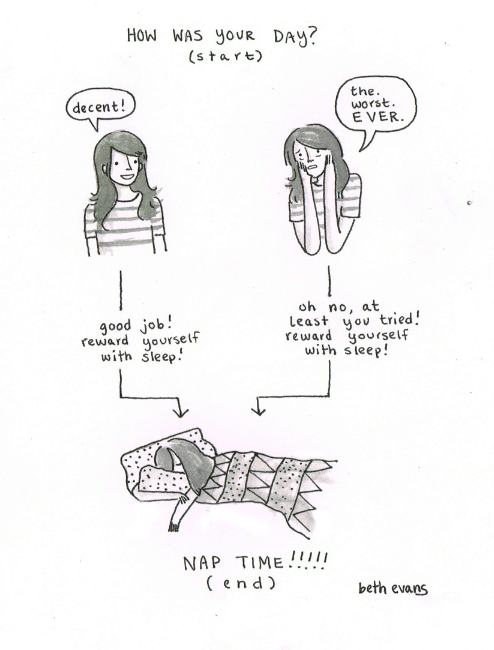As students, it's well known we often go without sleep. Hardly a teen movie goes past without a mention of the dreaded all-nighter, whether it's for coursework, essays or revision. As young adults we're often classed as lazy, expected to sleep well into the afternoon if left to our own devices- but it's not true. We have 9am lectures, 10am seminars, and then we're expected to run till late into the night or early morning to make the most of the 'university experience' whether that's through sports or clubbing or extra-curriculars. Heap on top of that the sheer amount of work lecturers expect you to do, and you're left with not enough hours in the day- and sleep is the easiest thing to sacrifice.
People aged 18-25 should be aiming for around 7-8 hours of sleep a night. With work and play and potentially even mental health all feeding into it, only 15% of us manage it regularly.
The consequences of even a tiny lack of sleep can be horrific- so listen up!
1. A lower stress threshold. When you're already in a stressful environment, being more susceptible to stress is never going to be helpful. Tiny things like going to the shops, getting dressed for lectures, meeting a friend can suddenly seem insurmountable.
2. Increased mood changes. Tiny little things become the most annoying things ever when you're tired. Dropped your toast? Why don't you cry over it, your tired brain tells you. You're suddenly having to put energy you don't have into keeping yourself going and some things are bound to slip. It takes effort to stay happy and sociable, and being tired makes it much more difficult.
3. Decreased memory capacity. Deep sleep fosters the formation of connections between neurons, and REM sleep aids in memory formation. An all-nighter really is a silly option when you consider that all the revision you've already done could slip, and nothing you learn during the night will stick if you don't sleep on it afterwards. Studies have shown sleep deprived people have less long and short term memory skills than those who have slept for longer periods of time.
4. Difficulty concentrating. If all your power is going into keeping your eyes open and your brain on, less is available for paying attention. For the same reason we want well rested doctors and teachers, you need to be awake, properly awake, to understand and process what's going on around you. Without sleep, fine details are often missed- whether that's remembering to add sodium hydroxide to your flask or finishing off painting the end of the piece. Just an hour of lost sleep decreases your alertness by up to 32%.
5. General slowness. Everyone's experienced the way the day lags when you're tired, but you do, too. You think slower, you write slower, you react slower. Not the most useful for when you're trying to scribble down notes or answer exam questions or get a delicate experiment finished. It takes you longer to brush your teeth, to cross the road, to do anything.
6. Increased food consumption. Not the best for the student on a budget, missing out sleep makes you hungrier (because you need to get that energy somewhere). You also lose the pleasure response to eating food, so your brain tells you that you need to eat more until you're happy and satisfied. It increases your body's need for high levels of fat and carbohydrate, which are more likely to make you gain weight if they're not part of a balanced diet.
7. Increased risk of accidents. Sleep deprivation is the #2 cause of automobile death in under 25s (second only to drink driving.) Your reaction time is slower and you're more likely to fall asleep at the wheel. Sleep deprivation is the #1 overall cause of workplace accidents.
You might think you can adapt to lack of sleep. But I've always slept for 5 hours! I hear you cry. The thing is, after a while of not sleeping, you lose the ability to gauge whether your judgement is impaired and you're sleep deprived. In the chronically sleep deprived, it can lead to similar symptoms to being drunk- and we've all heard of the consequences alcohol can have, we're uni students.
So sleep well. Turn your computer off, put your phone away, read a book and have a hot drink. Have a hot bath or shower before you sleep, because the temperature change between hot water and room temperature makes you sleepy. Make sleep just as an important part of your revision schedule as revising. If you're having trouble sleeping, try exercising to tire yourself out. If you're still having trouble, consider seeing your GP.


No comments:
Post a Comment